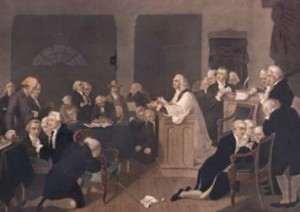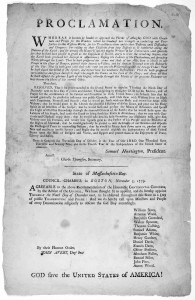Words From Our Founders: Congress’s Thanksgiving Proclamation, 1781
Today we continue our Words From Our Founders series examining our Founding Fathers’ own words on religion, religious liberty, and morality.
Below is a proclamation agreed to by Congress on October 26, 1781. The proclamation establishes December 13, 1781, as a day of thanksgiving and prayer. The proclamation also takes a retrospective look at the American Revolution, which, by the end of 1781, was drawing to a close with the surrender of General Cornwallis at Yorktown (referenced in the third paragraph of the proclamation).
PROCLAMATION
Whereas, it hath pleased Almighty God, the supreme Disposer of all Events father of mercies, remarkably to assist and support the United States of America in their important struggle for liberty, against the long continued efforts of a powerful nation: it is the duty of all ranks to observe and thankfully acknowledge the interpositions of his Providence in their behalf. Through the whole of the contest, from its first rise to this time, the influence of divine Providence may be clearly perceived in many signal instances, of which we mention but a few.

 Today we continue our Words From Our Founders series examining our Founding Fathers’ own words on religion, religious liberty, and morality.
Today we continue our Words From Our Founders series examining our Founding Fathers’ own words on religion, religious liberty, and morality. Today we continue our Words From Our Founders series examining our Founding Fathers’ own words on religion, religious liberty, and morality.
Today we continue our Words From Our Founders series examining our Founding Fathers’ own words on religion, religious liberty, and morality.